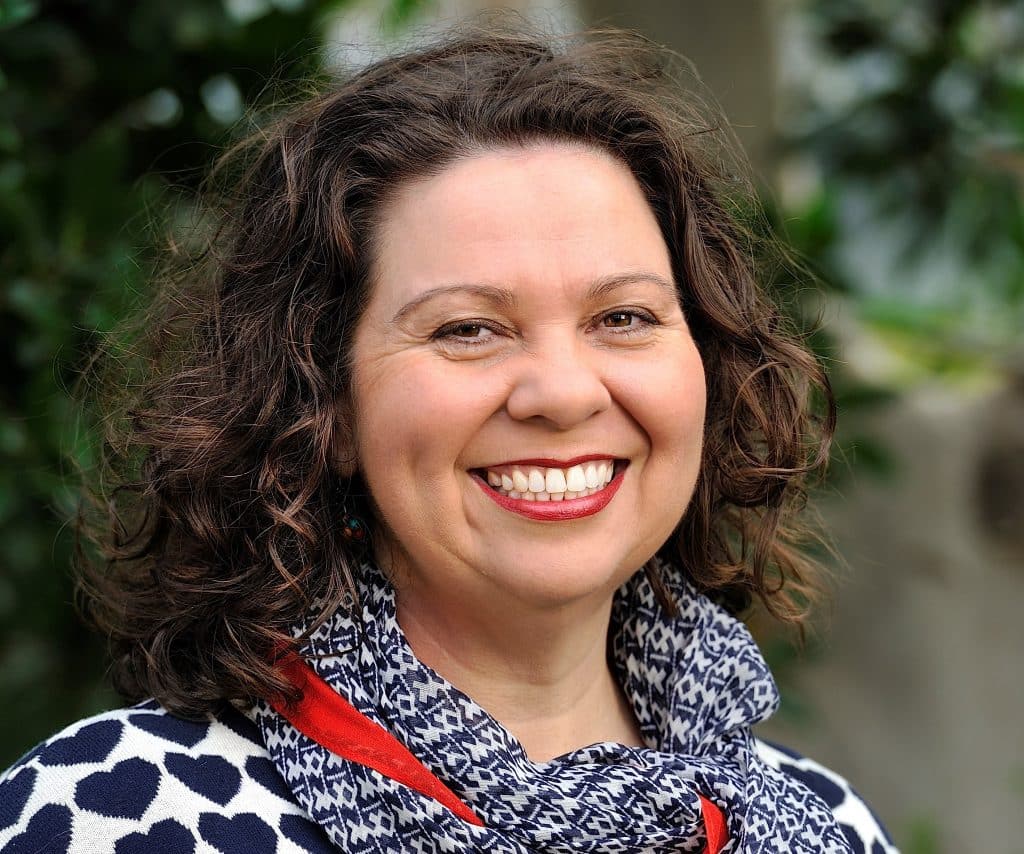
Jenan Taylor
1 August 2022
For the Reverend Canon Helen Dwyer, connecting with school children helps balance out the hardship of inhabiting a world that treats her differently.
As a small child Ms Dwyer used to be fascinated by the priest who led the Anglican church in the small country town where she lived.
The Ngarrindjeri woman recalls that every Sunday she would watch transfixed as the priest sang the Eucharist.
She loved going to the church, and believes it might be because that was where she first developed a sense that she was part of a community rather than an individual.
“It was a place where people would be kind to us, and even then I knew that that wasn’t necessarily the way people treated us,” she said.
“It made me feel very safe, and it remained a very safe place for me growing up. I am so aware was not the case for a lot of other people, but for me, that was always a place full of love.”
She wanted to do what he did, to make a difference to how people felt about the world, she said.
Just as long as she didn’t have to sing.
Read more: The accountant with a heart for holistic care
Ordained a priest 10 years ago, Ms Dwyer has since led an assortment of church parishes, worked in community justice organisations and in school chaplaincy roles.
She has also been a voice for Indigenous people on social justice issues and for reconciliation.
Her work has involved helping children and youths understand the contexts of issues like Black Lives Matter.
At other times she has reminded people that the treaty that Victoria’s Indigenous people are pushing for is not only important to Aboriginal people. “It’s important for non-Aboriginal people as well. Because a treaty is a formal cessation of hostilities.”
Her primary objective she said is to let the people she works with know that God loves them, and that they have been shown that love through Jesus.
“That means they are part of something bigger than what they can see around them right now, bigger than them, bigger than their experiences. Something really positive and full of hope,” she said.
“And we have we have a duty of care to share that love. We have a call to share that love. With everyone. Everyone we meet should be changed by that love.”
But it is work that can also be painful and distressing, especially when she finds herself subjected to outright racism in the process.
“It still catches me off guard, and it still hurts me,” she said.
At those times, it is easy to feel sapped of energy and of care.
“Sometimes I don’t want it to be my responsibility. I don’t want it. I don’t want to be the one that feels responsibility for somebody else’s ignorance and for helping them change,” Ms Dwyer said.
But Ms Dwyer finds a way back to balance through her work with children.
At the start of this year, she started chaplaincy at Melbourne Grammar’s primary school campus, Grimwade House. It’s a role she adores.
“As an Indigenous person who’s used to having to justify the space I take up in the world, it’s lovely being where people are fresh and willing to learn and to explore the possibilities,” she said.
They’ve shown excitement about discovering her Aboriginality she said, rather than any other emotion.
“I inhabit a world that treats me differently. And so to be in a workplace that is excited by it, is really uplifting and feels really safe,” she said.
“It is full of joy and full of challenges, but positive challenges. I don’t feel like I’m beating my head against a brick wall.”
Read more: The accidental pastor bringing a passion for the gospel to Greensborough
Ms Dwyer also believes that while she thinks she is there to teach them that God loves them, the children remind her that God loves her too.
It allows her to re-energise her efforts and her responsibilities she’s set herself as a priest.
“As much as I want to just avoid the pain of some people and only hang out with lovely people who enjoy my company and accept me for who I am, that’s not going to change the world. Part of ordained ministry is doing the work of Jesus in the world now. And he did some pretty bitey work. He wasn’t always loved for the work he did.”
She said it helped her to remember that, after all, education was the key to moving ahead of racism.
It accompanied another realisation that for many adults she encountered in her work, colonialism had structured a great deal of what they had had to learn at school.
“So, as much as it stings, and as much as it grieves me, I also have to be really rational about the education that they’ve received to this point, and how do I help them learn the truth?”
But trying to help someone unlearn what they think they know and then learn the truth is as difficult a process for her as it is for the other person.
“Nobody likes to be wrong. Even if it is through no fault of their own. Nobody likes to be wrong,” Ms Dwyer said.
But what made it all it worthwhile, was when people realised that being able to learn was a privilege, and then acted on that by educating themselves further, she said.
It was something that Ms Dwyer was able to witness recently when she preached at St Paul’s Cathedral.
“I was feeling nervous beforehand about giving the sermon I had planned, because I want people to be challenged. But I don’t want them to switch off because I’m being too blunt, or confrontational. But somebody thanked me and said my sermon had given them me lots of challenges and lots of homework,” she said.
“It’s so encouraging that somebody listened and responded by wanting to go and learn more. So that’s why I’m there. If one person said it, maybe two other people thought it or felt it. It’s all of those small things that add up. It’s the quiet gratitude that people express for being able to learn that make a difference.”.
Ms Dwyer wants to keep having the opportunities to speak into people’s lives, and to speak in particular about the love, hope and completeness that comes with faith in God.
What was most important, was the transformational change that could come about in people because of that love.
“It just comes back to a willingness to learn and be changed. And that’s true for our faith journeys, and for reconciliation. If we don’t have that willingness to learn and be changed, then that will be so much harder,” she said.
This profile of the Reverend Canon Helen Dwyer is part of a series on women in ministry, marking the December 2022 anniversary of 30 years since women were ordained in the Anglican Diocese of Melbourne.
For more faith news, follow The Melbourne Anglican on Facebook, Twitter, or subscribe to our weekly emails.






